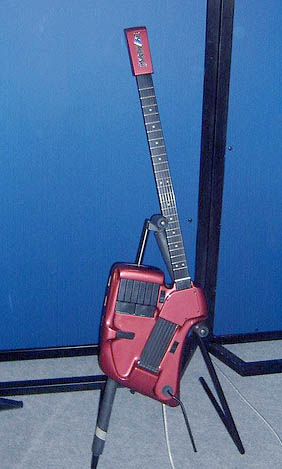The SynthAxe is a fretted, guitar-like MIDI controller, created by Bill Aitken, Mike Dixon, and Tony Sedivy and manufactured in England in 1985. It is a musical instrument that uses electronic synthesizers to produce sound and is controlled through the use of an arm resembling the neck of a guitar in form and in use. Its name comes from the words synthesizer and axe, a slang term meaning a guitar in rock music. The system was developed as a joint venture funded by Richard Branson's Virgin Group.

The SynthAxe itself has no internal sound source; it is purely a controller and needs synthesizers to produce sound.[1] The neck of the instrument is angled upwards from the body, and there are two independent sets of strings.
The fretboard is continuously scanned and sends signals to synthesizers which produce the sound. The left set determine the pitch played, through contact with the frets on the neck and by sensing the side-to-side bending of the string. The right set of strings are velocity sensitive; these strings can be plucked, strummed or damped in the same manner as a guitar. A keyboard made up of nine keys can also be used to trigger notes instead of the strings.[2] Design of the key toggles was done by the late David Fowler, at the time trading under BJ Hopkins Injection and toolmaking, in Littleworth, Oxford.
An electronic tremolo bar (the 'electronic wang arm') can be used for standard whammy bar effects, or can be redefined to produce different MIDI output such as filter cutoffs or volume.[3]
When originally produced, the SynthAxe was priced at £10,000[4][5] (approximately $13,000) and eventually sold for about £6,000. The instrument was built from aerospace and military grade hardware, and was such a sophisticated and expensive piece of machinery that few were sold, making it difficult to keep the company afloat. In or around 1986, Virgin Games took over the distribution but let it go after a couple of years.
Fewer than 100 SynthAxes were made,[6] and it is difficult to locate used units. Most musicians who desire a MIDI guitar controller often use other alternatives, such as Roland or Axon systems that can convert a guitar's output to MIDI via 13-pin cables and outboard devices or older systems such as the Roland GR-500.
Notable users
editProminent players of the SynthAxe included Allan Holdsworth, who used it extensively on his albums Atavachron (1986),[7] Sand (1987) and Flat Tire: Music for a Non-Existent Movie (2001);[8] Chuck Hammer, who worked with both Lou Reed and David Bowie, and was the earliest guitarist to use the SynthAxe in the United States; and Lee Ritenour, who used the SynthAxe on his album Earth Run (1986), the cover of which features the instrument.[9]
Gary Moore featured the SynthAxe in the music video for few seconds for his 1985 single with Phil Lynott, "Out in the Fields."[10] Christopher Currell used it to control the Synclavier on Michael Jackson's Bad tour[11] Béla Fleck and the Flecktones drummer Future Man also uses a highly customised version of the SynthAxe that he purchased in its original form from Ritenour.[12]
References
edit- ^ "SynthAxe - Allan Holdsworth Information Center". fingerprintsweb.net. Retrieved 2020-10-09.
- ^ 4658690, Aitken, William A.; Sedivy, Anthony J. & Dixon, Michael S., "Electronic musical instrument", issued 1987-04-21
- ^ "Original Demo of the SynthAxe". YouTube. Retrieved 2020-10-09.
- ^ "SynthAxe: Back in 1986 a complete system was nearly £10,000 sterling". www.hollis.co.uk. Retrieved 2020-10-09.
- ^ "Andy Summers in Guitar Player Interview 1986". Retrieved 2020-10-12.
- ^ Alec Standsfield: The SynthAxe
- ^ Innerviews. "Allan Holdsworth - Visual music". Innerviews: Music Without Borders. Retrieved 2020-10-09.
- ^ "SynthAxe - Allan Holdsworth Information Center". fingerprintsweb.net. Retrieved 2020-10-09.
- ^ "Lee Ritenour". Retrieved 2020-10-09.
- ^ "Gary Moore on guitar and SynthAxe, visible around 2:00". youtube. Retrieved 2020-10-09.
- ^ "Synclavier History Tour and The Quantum Potential With Christopher Currell". Encyclotronic. Retrieved 2018-09-04.
- ^ [dead link]Futureman's Synthaxe Drumitar Archived 2018-01-26 at the Wayback Machine flecktones.com.